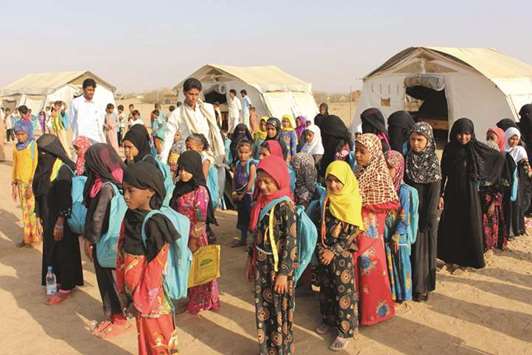Rescuers in Syria’s eastern Ghouta said the bombing would not let up long enough for them to count the bodies, in one of the bloodiest air assaults of the seven-year war.
Warplanes pounded the rebel enclave yesterday, the seventh day in a row of a fierce escalation by Damascus and its allies, an emergency service, a witness and a monitoring group said.
Residents holed up in basements and medical charities decried attacks on a dozen hospitals, as the United Nations pleaded for a truce in Ghouta, the only big rebel bastion near the capital.
The Damascus government and Russia, its key ally, say they only target militants.
They have said they seek to stop mortar attacks injuring dozens in the capital, and have accused insurgents in Ghouta of holding people as human shields.
There was no immediate comment from the Syrian military.
A surge of rocket fire, shelling and air strikes has killed over 500 people since Sunday night, the Syrian Observatory for Human Rights said.
The dead included more than 120 children.
The Britain-based monitor said raids hit Douma, Zamalka and other towns there yesterday, killing 31 people.
First responders searched for survivors after strikes on Kafr Batna, Douma and Harasta, the Civil Defence in eastern Ghouta said.
The rescue service, which operates in rebel territory, said it had documented at least 350 deaths in four days earlier this week.
“Maybe there are many more,” said Siraj Mahmoud, a civil defence spokesman in the suburbs.”We weren’t able to count the martyrs yesterday because the warplanes are touring the skies.”
As the bombs rain down, some hitting emergency centres and vehicles, workers have struggled to pull people from the rubble, Mahmoud said. “But if we have to go out running on our legs and dig with our hands to rescue the people, we will still be here.”
A witness in Douma said he woke up in the early hours on Saturday to the sound of a squadron of jets bombing nearby.
The streets have mostly remained empty.
The United Nations says nearly 400,000 people live in eastern Ghouta, a pocket of satellite towns and farms under government siege since 2013, without enough food or medicine.
The local opposition council said it was setting up emergency volunteer teams in several districts to reinforce shelters with sandbags and try to link them through tunnels.
“Every day we say God willing tomorrow will be better...Today, the main sight in the Ghouta is limbs, blood,” Mahmoud said. ”There is no need to dig graves, we will be buried under our houses.”
Several previous ceasefire attempts have quickly unravelled during the multi-sided conflict, which has killed hundreds of thousands and forced 11mn people out of their homes.

Syrian children injured by reported regime bombardment sit in a make-shift clinic to receive treatment for their wounds in the rebel-held town of Douma, yesterday.
